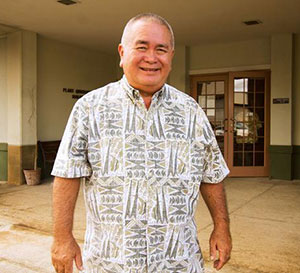 Richard Ha, President, Hamakua Springs Country Farms DENNIS ODA / [email protected]
Richard Ha, President, Hamakua Springs Country Farms DENNIS ODA / [email protected] The Honolulu Star-Advertiser ran an interview with Ha in the February 27, 2015 edition. While not specifically referring to Transition with a capital T, Ha addresses many Transition issues: peak oil, local control, alternative energy, local agriculture, and challenges faced by young farmers.
We have excerpted several passages. The full article is available to subscribers by logging in.
Honolulu Star-Advertiser
February 27, 2015
Richard Ha
The Hawaii island farmer is an outspoken advocate for sustainable energy
by Vicki Viotti
excerpts:
"Back around 2005, 2006, 2007, we started noticing our input costs were going up. It didn't take us long to figure out that it's all related to oil. That's why I went to the first Association for the Study of Peak Oil conference [in 2007].
…
"...if you look at it on your financial statement, and just look for utilities cost, or fuel, that's not all the effect of oil price. Petroleum prices affect the price of everything, because it's plastics and everything.
…
"I've been to five of these oil conferences ... and as I started to get into it I realized it's a lot more complicated than I thought. It involved oil, and next it involved natural gas. And the characteristic of natural gas is that the natural gas wells deplete in five years.
…
"The big oil boom we had, the shale oil boom we had from 2008 to now, is made up of a whole bunch of small wells to produce the amount that we do. But it depletes so quickly that we gotta replace 40 percent of it, just to stay even.
…
"But the problem after that is, how much oil and gas do we actually have? And some credible studies say we don't really have that much. We think we do, and we're the Saudi America. And I worry, because we are so vulnerable here in Hawaii. So we've got to hedge our bets.
…
"...Kauai Island Utility Cooperative. They came over and gave a briefing.
And the people decided, wow, that's kind of interesting, because Kauai had been actually able to get their electricity rates to go down over the 12-year period. Everyone else went up. On top of it ... it's a co-op, so the people own the utility. And if the utility makes money, the people get the rebate. ... So people thought, "Why don't we just look at that option?"
…
"The issue is, if we did not look into it and prepare, so that if the opportunity arose we could make an offer, we would never be in the game. We could never exercise the option.
…
"I was the only person to have gone to five peak-oil conferences for all of Hawaii. So, I felt an obligation to kind of say what I had heard, and warn people. So I kind of was stuck with the kuleana, they say, eh? Responsibility. I didn't really want to do this. I was just minding my own business before this happened.
"You know what happens when you go to five? Over a period of time you get to see who said what, and you get to see who's credible and not. And if you're an observer and trying to figure out motivation, pretty soon a pattern starts to evolve. And then you can feel more confident that what you think is happening is actually happening.
…
"I think ag and energy are inextricably entwined. I see so many young folks want to get into agriculture. I mean, everybody's talking about school-to-farm programs, and all kinds of stuff.
"But then when you look at how many young folks are going into farming -- and I kind of know how hard it is to be successful in farming -- I see they're having a hard time making money.
"My basic idea is that, if we are looking for food sustainability, it's about farmers farming. And I would say if the farmers make money, the farmers will farm.
…
"What has happened, in my mind, is that oil prices quadrupled in the last 10 years, and we have not seen the consequences of that."

 RSS Feed
RSS Feed
